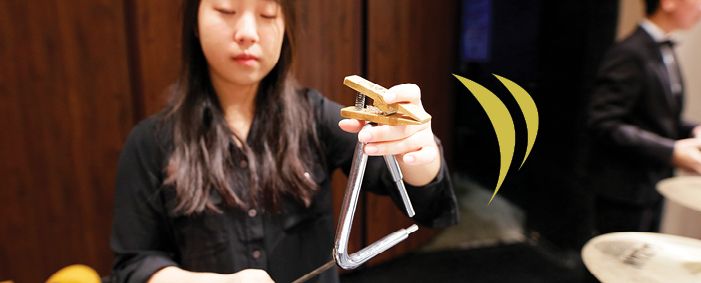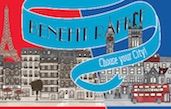Helpful Rehearsal/Performance Practices from Maestro Eylar
Keep in mind your stage & rehearsal presence, show your musicality on stage, and enjoy what you are doing - whether you are rehearsing or performing. Remember that you are the California Youth Symphony orchestra: the orchestra that embodies all the CYS programs, and one of the things our local audiences and audiences abroad (!) really look for, besides a flawless performance by young musicians, is SEEING the musicians enjoy the art of music making.
With that in mind, a couple of things to eliminate during rehearsals and performances to help improve your own personal performance practices:
- Tapping feet. Your tapping feet never wind up matching the conductor's tempi. Instead, try memorizing some parts to enable you to maintain good peripheral view of the Conductor or Concertmaster, and keep your ears open for strong rhythmic cues from other instruments in the orchestra.
- Rushing. The key point here is really very simple: continuous eye contact with the Conductor (note the point stated above). All orchestra members should keep an eye on Maestro Eylar, especially at the critical places (i.e. tempo changes, accelerations, ritardandos, etc.). Doing so will eliminate the problems of rushing. Look through your music and mark those spots right away. Some things to consider:
- Ask yourself if you are giving the rests their full value. Conversely, ask yourself if you are giving the notes their full value.
- Bear in mind the following: in the art of music, space is as expressive as sound.
- You may need to address technical issues with certain passages to keep you from rushing.
- Remember: the better you know the music (i.e. listen to it a lot!), the better you will play!
- Dragging the tempo. The same concepts apply.
- Visually counting rests. This does not mean you shouldn't count your rests! But be very discreet about counting your rests: maybe you can keep your hands on your lap while counting rests rather than displaying your hand right in front of you. Write cues in your parts. Count the measures of rest to yourself without having anybody else hear it, for you might throw off the other person's own counting.
- Poor posture or looking disengaged with the conductor & orchestra. Always maintain good, comfortable playing posture and always look engaged with the conductor/orchestra. Whether you are playing, or sitting/standing and counting rests, always maintain good posture. Slouching, picking your nose, yawning (this is a common one, alas) or biting your nails during your rests is a no-no. Be attentive to the music going on around you.
- Overpowering the melody and/or soloist. Instead, always aim for dynamic contrast (as section and as the individual player). Reducing your playing volume does not mean you reduce the energy that Mr. Eylar desires. Allow the melody and/or soloist to be heard effectively over the orchestra. CYS string players always need to remember that they are playing in an orchestra that has a larger string section than any professional orchestra in the world. Let's have some real dynamic contrast!
- Not smiling when you stand to be acknowledged by the audience. Scary. The audience is clapping with happiness and thankfulness for brightening their day with your performance. Smile back knowing you have a very receptive crowd of serious and appreciative music lovers.
This is not a huge list, but making these changes will go a long way in making your own personal performance practices better and better.
Other Helpful Survival Tips from the Musicians Council
- Don’t let Mr. Eylar catch you scanning for guys/girls during rehearsal (He sees all).
- Even when you’re lost, keep counting, watch the conductor for cues, and listen. This ensures that you won’t get more lost and play loudly during the rests.
- Don’t chew gum or cross your legs or feet.
- NEVER have a cell phone operational during a rehearsal. It is vital that everyone is paying attention. There will always be a break in the middle of rehearsal, and you can check your phones then. Better yet, hang out with your orchestra friends!
Know the Music
- Listen to the suggested recordings of all the year’s music. Listen to them all until you can sing them in your sleep. There is no substitute for knowing how the music goes!
- Turn the recordings up loud, and practice your part with them.
- Mark your parts as you listen
More on Surviving Rehearsals
- ALWAYS bring a pencil to rehearsal-and use it!!! Mark your parts every time you make an error or mistake – the Maestro will be checking your parts. This is perhaps the most important thing of all when playing in CYS (If you pretend to scribble on your music, better make sure to really mark your parts ASAP, so you don’t make the same mistake twice! (Ask your fellow section members for some help, if you can’t remember what the corrections are.)
- Bring your music to every rehearsal (and concert), so that markings made during rehearsal may be noted for practice at home.
- When the Conductor stops, YOU stop-immediately! Nothing aggravates a Conductor more than musicians who continue to play for ten seconds after he/she has stopped the orchestra (it proves that you have not been watching the Conductor!)
- Don’t be late to rehearsal. Tardiness at rehearsals is A) unprofessional, and B) will reduce your chances for advancement. And during those unfortunate times when you scramble in late, be careful not to crash into someone’s instrument on the way to your seat. If you do, an apology would be appreciated.
- String players: Learn to follow bowings (when you don’t know the notes, it actually makes the faking look real…but, please, you are expected to learn to play your part.) Refer to the person in front of you as to where that person's bow placement is (i.e. tip of the bow? At the frog?)
- Strings: Don’t use a wide, wobbly vibrato. Fast and vibrate each note. Vibrate on double and triple stops!
- Winds & Brass: Play soloistically and phrase beautifully, and play one on a part, if dynamic is “mp” and below.
- Thoughtful preparation and a nice OH breath for every entrance.
- Start with a great tone and technique.
- Carry that tone and technique with you from note to note.
- Aim for a controlled sound at every single moment. Not shrill or squeamish!
- Improve intonation by:
- Careful pre-tuning of your instrument every day (use an electronic tuner).
- Anticipating the sound and harmony of the next note in your head.
- Being ready to listen and adjust as soon as you have played the note.
- When tuning, do it at “p,” and don’t be practicing your parts when you’re finished tuning. (You’ll “p.o.” the Concertmaster and oboist.) Remember the 4 steps of tuning:
- Listen
- Play
- Compare
- Adjust
- Pay as much (or more) attention to how you end phrases as you do to how you begin phrases.
- Equally important is to pay more attention to dynamics, as this is the way of communicating intensity, not just volume, and the expressive quality in music. Again, aim for dynamic contrast. If you are a concertmaster or section leader, it is your job to help get your section to balance their sound.
- If sitting close to the percussion or brass sections, wear earplugs!!
- Don’t take it personally when the Maestro criticizes your playing. Listen and take steps to improve. Work with him if you have trouble interpreting the music the way he wants it. He is very helpful!
Relationships
- ALWAYS greet “HI, Mr. Eylar” and “BYE, Mr. Eylar” to Mr. Eylar. Say it loudly and make eye contact. Better yet, strike up a conversation with Mr. Eylar. He’s actually a cool guy.
- Don’t be miffed if Mr. Eylar doesn’t treat you special; remember, he isn’t God. He is always grateful when you show up to rehearsal and you are well-prepared.
- Don’t let your stand partner monopolize your space; speak up (nicely)
- Don’t be competitive with your stand partner. Work as a unit and section, as a whole.
- Oppressed instruments (violas): Walk away when they mock you.
- Be friendly to everyone. Don’t be the person who talks to people at camp, but ignores them for the rest of the year. Make new friends and be inclusive of other people, even if you have your differences!
- Don’t let seating worries ruin friendships. Your CYS career will be over before you know it. The best things you can take away from the experience are good friends and superior music-making.
Concerts
- FOLLOW and respect the dress code. Jeans are not slacks. Black tennis shoes are not dress shoes. Don’t wear low-riding pants that reveal your butt crack when you sit down.
- String section leaders: Give bigger cues than the ones you got last year.
- Keep your cool, so you don’t rush! Watch the magic wand (and duck when you see it coming, especially second violins and cellos! The Maestro would never dream of hitting his precious first violins, and he needs every violist he can find.)
- ENJOY! (The bored-zombie look is popular among CYS musicians. Don’t conform to this attitude: sit up and look alert. When Mr. Eylar signals you to stand, turn your body to the audience and SMILE and welcome your audience of music-lovers!
Have a Happy Season!





